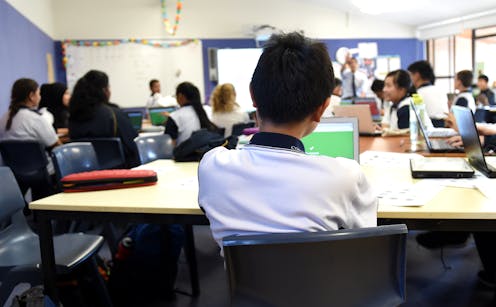If Australian schools want to improve student discipline, they need to address these 5 issues
- Written by Anna Sullivan, Professor and Director, Centre for Research in Educational and Social Inclusion, University of South Australia

NSW is in the middle of overhauling its approach to suspensions and expulsions.
Under a proposed plan due to start in term 4, students can only be sent home a maximum of three times a year. This is designed to reduce the high number of sanctions against vulnerable children in public schools. But it has been met with opposition from teachers, who say it will increase safety risks when managing disruptive students.
This comes amid a wider debate about how to approach student discipline, which continues to be one of the most difficult issues in Australian schools. The views about student behaviour are diverse and often passionate, with some arguing students should be “punished”.
Unfortunately these views do not always reflect the research, which shows tough approaches make student disengagement worse.
Read more: Why suspending or expelling students often does more harm than good
What is school exclusion?
Suspensions and expulsions are traditionally used by schools to manage problematic student behaviour.
They are given to students who disrupt the “good order” of schools or threaten others’ safety. Schools use suspensions to help change unproductive student behaviours or allow time for other strategies to be implemented to help avoid repeat situations.
Exclusions vary across Australia. They can either be for a short time, a long time, or they can even be permanent.
State and territory legislation and departmental discipline policies provide guidance on how schools should prevent and respond to problematic student behaviours around Australia.
Recent data from states indicates school exclusions are on the rise. For example, in Western Australia there was a new high of 18,068 suspensions in 2021, an increase of 13% from 2020.
5 issues that need more attention
We are researching how and why Australian schools use exclusionary practices – like suspensions – to manage disorderly students.
Policymakers and schools need to give more attention to the following issues when it comes to discipline and behaviour.
1. Some groups of students are suspended more often
Research over the past three decades has consistently shown suspensions and expulsions disproportionately target students from diverse or minority backgrounds. This is particularly the case for those with a disability or those from specific racial, ethnic and class backgrounds.
For example, in NSW in 2021, while 3.3% of all students were suspended, 10% of Aboriginal students and 8.4% of all students with disability were suspended.
This is not just the case in Australia, but also in the United States, United Kingdom and New Zealand.
Read more: NSW wants to change rules on suspending and expelling students. How does it compare to other states?
2. We don’t have the full picture
Official statistics provided by education departments offer a publicly available account as to the number of students schools have suspended and expelled from schools.
However, these figures do not always present an accurate picture. Students can be excluded from the classroom in other ways, that are not captured in official data.
For example, schools might let students remain on the school grounds for partial or full days, but not let them join their peers for lessons. This allows schools to “maintain statistical respectability”.
3. What else is going on in students’ lives?
Often discussions on how to manage students’ behaviour focus on responding to the individual’s academic failure, behaviour or disinterest in school. They don’t look at the broader complexities of their lives.
When looking at whether suspension or exclusion is an appropriate discipline technique, schools should consider the likely impact on a child’s life chances, especially for marginalised children. Will a suspension put at risk the chances of the student completing school? Will the student be supervised while they are not allowed to attend school?
Understanding how poverty and other forms of social inequality contribute to behaviour in schools is important.
There are many other ways to manage students’ behaviour that are more supportive and can lead to more positive outcomes for the school, students and families. For example, teaching students how to manage conflict or how to manage their anger.
4. Make students feel valued
Research tells us students value schools which make trust, respect and care central to everything that happens there.
If we are going to help students connect to schooling, we need to look at the deeper causes of student disengagement. This means understanding and attending to students who feel like they do not matter or do not fit in or feel like their interests are not recognised.
This requires a commitment from schools to connect to student’s lives and communities as the foundation for curriculum design and learning.
Treating teachers like professionals and giving them the time and resources to plan engaging and differentiated lessons is critical. This also involves talking and listening to what young people have to say.
5. The broader political context
Schools of course exist in a broader social and political climate. In Australia, the trend in education has been to prioritise individuals and individualism over the public good.
At the broader level, this has seen an emphasis on standards, performance and national testing.
At the micro level, this encourages schools to view problem student behaviours as the responsibility of individuals. So this means there is a focus on blaming “disruptive” students, “dud” teachers or “negligent” parents, rather than look at the influence of broader public policy settings.
So, while the NSW government is making positive steps, there is still so much more to be done to improve our approach to student discipline.
University of South Australia researcher Olivia Yearsley contributed to the research on which this piece is based.
Authors: Anna Sullivan, Professor and Director, Centre for Research in Educational and Social Inclusion, University of South Australia



















